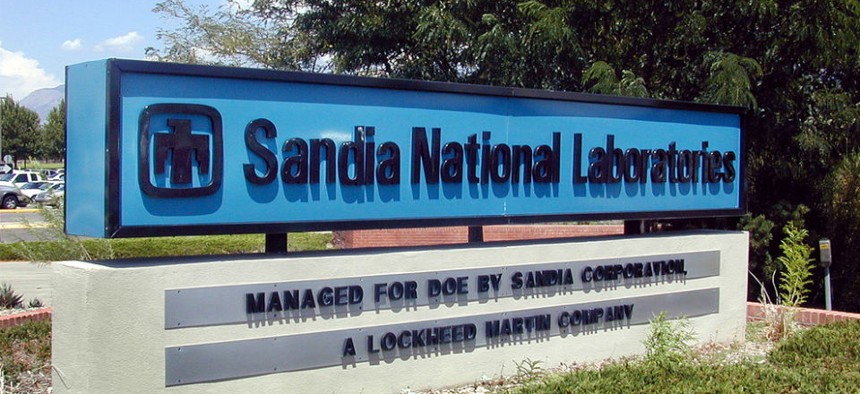
Sandia National Laboratories file photo
IG: Energy Lab Lobbied Officials for $2.4 Billion No-Bid Contract
Sandia National Laboratories used government funds in efforts to extend Lockheed Martin’s management deal without competition.
Federal investigators say employees at Sandia National Laboratories used taxpayer funds to lobby members of Congress and senior department officials to extend the lab’s management contract with Lockheed Martin Corp.—valued at $2.4 billion annually—without opening it up for competition.
“The use of federal funds for the development of a plan to influence members of Congress and federal officials to, in essence, prevent competition was inexplicable and unjustified,” Energy Inspector General Gregory Friedman concluded after conducting a special inquiry into the allegations. The IG’s Nov. 7 report was released Wednesday.
Lab officials defended their actions, which included spending $226,378 to hire former Republican lawmaker Heather Wilson of New Mexico to press her former Congressional colleagues and administration officials for the no-bid deal, on the grounds that that’s how they have done business in the past. But the IG documented that Sandia’s own legal council had warned that neither the lab nor the department “could tolerate even the suspicion that Sandia was assisting in the competition at prime contract expense.”
Sandia is a government-owned, contractor-operated lab in the National Nuclear Security Administration’s nuclear weapons complex. The New Mexico facility has been operated by the Sandia Corporation, a wholly-owned subsidiary of Lockheed Martin Corp. (or it’s predecessor company, Martin Marietta) since 1993, when the contract was awarded competitively. But since that original contract expired in 1998, Energy has repeatedly extended the contract without competition, most recently in March for at least two years.
The use of federal funds to advance Lockheed’s corporate interests is prohibited by federal law (31 U.S.C. Sec. 1352, Limitation on use of appropriated funds to influence certain Federal contracting and financial transactions, and Federal Acquisition Regulation 31.205-22, Lobbying and political activity costs) as well as the terms of the contract itself, Friedman wrote.
The investigation found that lab officials developed a contract strategy team to coordinate their efforts with Lockheed Martin. According to the report:
In an email dated July 6, 2009, a senior member of the SNL Contract Strategy Team expressed concern that SNL’s Contract Strategy was stalled and that the laboratory needed the support of the then NNSA administrator to advise the then secretary of Energy on the benefit of extending the contract noncompetitively. An SNL consultant suggested that SNL start working the “edges,” like key members of Congress, that SNL’s message “to these people” should be that competition was not in the best interest of the government and that SNL should ask them to call then Secretary [Steven] Chu and tell him that a re-compete at SNL was not needed.
In addition:
Documentation from one meeting indicated that a senior SNL official met with a member of the New Mexico Congressional delegation and engaged in discussions on the merits of a contract extension without competition; conducting an aggressive campaign to avoid an RFP process; and informing the secretary of Energy that the nation would be better served by preserving the SNL/[Lockheed Martin] team.
The IG recommended the department develop clear guidance about the type of information the lab could provide under federal law and regulation; determine whether Sandia Corporation had violated the terms of its contract with the department; recover costs of unallowable activities; and determine if performance fees paid under the contract need to be adjusted.
Frank Klotz, undersecretary for nuclear security and NNSA administrator, agreed with the IG’s findings and recommendations. He said the department had already sought and received reimbursement for Wilson’s consulting fees and a team of financial, legal and contracting experts would identify other unallowable expenses incurred by the lab and recover them.
“Further, once the evaluations are complete, NNSA will determine if any adjustment to performance fees is warranted based on the administration and management issues” raised by the investigation, Klotz said.







